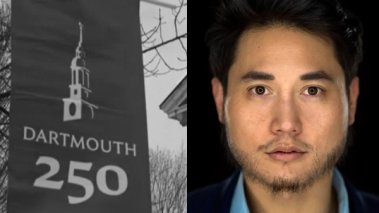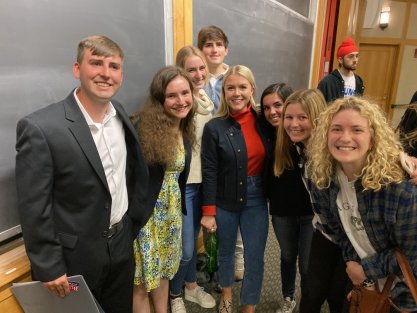Table of Contents
Dartmouth continues to violate College Republicans’ rights, imposing $3,600 in security fees following Andy Ngo event

Andy Ngo / Twitter.com
Dartmouth College has asked the campus chapter of the College Republicans to pay thousands of dollars in security fees for an event that was moved online featuring journalist Andy Ngo.
After unilaterally canceling their in-person event featuring conservative journalist Andy Ngo, Dartmouth College has now informed the College Republicans campus chapter that it must pay $3,600 in security fees for the canceled event, or else it cannot request further funds from the college.
This comes after a monthslong saga that saw Dartmouth act in bad faith every step of the way. Dartmouth canceled the Jan. 20 event hosted by the campus chapters of the College Republicans, Turning Point USA, and Network of Enlightened Women, forcing it online based on unspecified “concerning information” from the Hanover police. FIRE sent a letter to Dartmouth explaining that the college must choose the “least restrictive means” to limit free expression when advancing asserted safety interests, and requesting clarification about why the college canceled the event. That same day, FIRE also sent a letter to the Hanover police department asking what information it provided the college that could have led to the cancellation.
As expected, Dartmouth evaded FIRE’s questions, stating that the college was “deeply concerned about the credible threats to participant safety shared by local law enforcement” before the event began, but is pleased that “all of those in attendance were free to exercise” freedom of speech. As we told Dartmouth, this was not enough.
The Hanover police, however, cooperated with FIRE’s request for clarification, sharing public records and a letter from the police chief stating that the police “did not make a recommendation to Dartmouth College regarding the January 20th event.” Upon receiving this information, FIRE sent Dartmouth yet another letter explaining why it must not use bogus safety concerns to justify canceling student events.
Unfortunately, we were not surprised when Dartmouth doubled down, stating that the Hanover police relayed to the college that “the information they received . . . was credible and caused them concern for the safety of those on campus.”
We tend to believe the actual records from the police — which show no recommendation for Dartmouth to cancel events — over Dartmouth’s vague statements of “concerning information.”
Sounds bad, right? Well, it gets worse.
Now, Dartmouth has tripled-down, informing the College Republicans that they must pay $3,600 in security-related charges for the Andy Ngo event, which — at Dartmouth’s behest — never occurred in person, and took place only online.
FIRE wrote Dartmouth today, informing the college we are stunned by its decision to further curtail students’ expressive rights by imposing thousands of dollars in security fees for an event that never happened in person, and refusing to fund future College Republicans events until these exorbitant fees are paid — effectively placing a tax on controversial expression and, once again, acquiescing to a heckler’s veto.
As we said in our letter:
Requiring the College Republicans to pay for the costs of security for its event imposes a financial burden on a student group based on the controversial nature of a group or event’s expression. In doing so, Dartmouth allows for, and indeed incentivizes, the exercise of a “heckler’s veto” by anyone wishing to silence that student group’s controversial or unpopular expression—this, on top of Dartmouth’s original capitulation to the heckler’s veto when it canceled the in-person Ngo event. Dartmouth’s actions here impermissibly align the college with those who would threaten unlawful conduct over the clear expressive rights of its own students.
Dartmouth’s imposition of these fees effectively prohibits the College Republicans from hosting future events by forcing them to either incur a large debt or shut down their expression.
“To say that Dartmouth supports free speech on campus is simply not true,” Dartmouth College Republicans Vice President Chloe Ezzo said in an email to FIRE.
This concern is not hypothetical. The student group plans to hold an event featuring conservative political activist James O’Keefe on April 20 and has been denied funding for the speaker’s honorarium as well as for security at the event. The group will now have to suffer further debt or cancel its event.
Indeed, given Dartmouth’s actions, students face a difficult choice when choosing campus speakers: incur excessive security fees, self-censor expression that may anger others, or speak while threatened with deplatforming or censorship. This dilemma is impermissible at colleges — like Dartmouth — that promise students robust expressive rights.
“To say that Dartmouth supports free speech on campus is simply not true,” Dartmouth College Republicans Vice President Chloe Ezzo said in an email to FIRE. “At a college with an $8.5 billion endowment, the fact that the Dartmouth administration is trying to burden us with these security fees says everything you need to know about how much they prize the expressive rights of their students.”

When higher education institutions promise students free expression, longstanding judicial interpretations of the First Amendment’s guarantees of free speech and association set useful baselines for what rights students reasonably expect on campus. As we told Dartmouth, the United States Court of Appeals for the Fifth Circuit’s decision in Sonnier v. Crain is instructive: There, the court invalidated Southeastern Louisiana University’s policy that allowed the university unfettered discretion to charge security fees, and lacked objective factors for the university to follow.
The Supreme Court’s decision in Forsyth County v. Nationalist Movement, though not related to a university, explains that varying fees for events based on how much police protection the government expects the event to require places the burden on the speaker to pay more for speech that others may deem controversial. As the Court said:
The fee assessed will depend on the administrator’s measure of the amount of hostility likely to be created by the speech based on its content. Those wishing to express views unpopular with bottle throwers, for example, may have to pay more for their permit.
The Forsyth Court disapproved of this practice: “Speech cannot be financially burdened, any more than it can be punished or banned, simply because it might offend a hostile mob.”
We made this clear to Dartmouth:
FIRE understands the Hanover police’s involvement in the Ngo event incurred substantial fees for the college. However, Dartmouth, in promising to create a campus where free speech is protected, may not pass its burden onto student groups.
FIRE hopes to see Dartmouth change course and finally live up to its commitment that its students enjoy free expression. The College Republicans are hosting O’Keefe on Wednesday. We call on Dartmouth to rescind the $3,600 in security fees imposed on the College Republicans and allow the O’Keefe event to move forward without issue — including allowing them to seek funding as the needs of the event may warrant.
FIRE defends the rights of students and faculty members — no matter their views — at public and private universities and colleges in the United States. If you are a student or a faculty member facing investigation or punishment for your speech, submit your case to FIRE today. If you’re faculty member at a public college or university, call the Faculty Legal Defense Fund 24-hour hotline at 254-500-FLDF (3533).
Recent Articles
FIRE’s award-winning Newsdesk covers the free speech news you need to stay informed.

A third of Stanford students say using violence to silence speech can be acceptable

Stanford president and provost cheer free expression in open letter to incoming class

FIRE survey shows Judge Duncan shoutdown had ‘chilling effect’ on Stanford students


